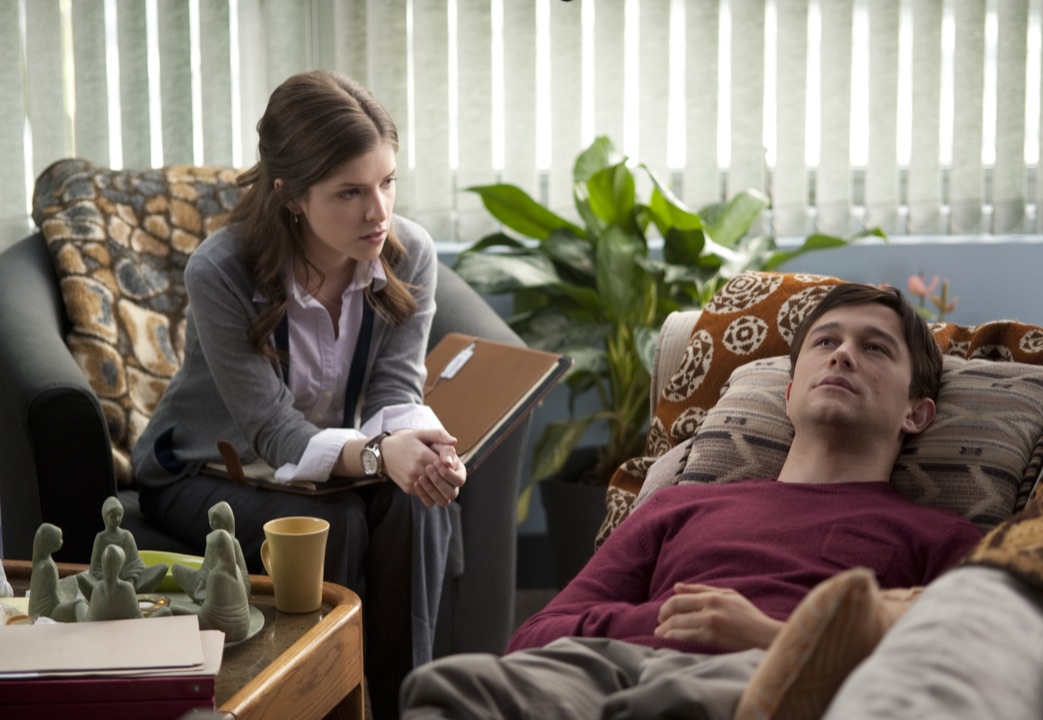 |
| Joseph Gordon-Levitt AND Anna Kendrick in 50/50. © Summit Entertainment. |
Many have considered it the indie movie of 2011, and, although it was shut out at the Oscars, 50/50 does have the credentials. Based on the life story of first-time screenwriter Will Reiser and produced by co-star Seth Rogen, his friend in real life, the movie is, aesthetically speaking, a typical indie flick, with the song-based score, the cold, delicate cinematography, and the wintry urban landscape of Seattle as the backdrop, and it drew everyone's attention for switching between drama and comedy continuously.
For starters, the movie starts pretty indie-ish-ly: Joseph Gordon-Levitt in a sweatshirt runs next to a river in Seattle, gets home, takes a shower, talks to his girlfriend Bryce Dallas Howard, and enters his best friend Seth Rogen's car to go to work. This is Adam Lerner, a good-guy journalist who doesn't smoke, doesn't drink and doesn't drive. What is his surprise, then, when a doctor tells him that he has a malignant tumor on the spine, and will need to undergo chemo. The reactions of his peers are alternately funny and dense, like the rest of the movie will be: Kyle, the best friend, drops a lot of F-bombs (it's Seth Rogen, after all, pretty much playing himself), the overprotective mother (Anjelica Huston), who already has to look after her husband with Alzheimer's, gets into her head that she should move in with her son so she can care for him, and the girlfriend refuses Adam's generous offer to end things and claims, reluctantly, that she can deal with that. Adam tries to learn more about his condition, and we discover the meaning of the title -- he has a 50/50 chance to survive.
Factors, of course, start to gather and give the movie a psychological background, factors that at first seem like comic relief but later on will contribute to the protagonist's psychological degradation, as he tries at all costs to maintain composure amid the hell that is cancer treatment. Cue a young, inexperienced therapist (Anna Kendrick) who doesn't seem to know exactly what she's doing while trying to help Adam keep his head together, which makes him even more skeptical, and two old men who are also undergoing chemotherapy (the excellent Matt Frewer and Philip Baker Hall) and give Adam lessons on life, love etc. in between sessions. Furthermore, his friend Kyle provides comic relief, trying to help Adam remain optimistic and enjoy life while simultaneously taking advantage of his disease to get a girlfriend.
At a certain moment in the film, everything seems fine -- Adam has two new friends to unburden himself, his therapist grows closer and closer to him even outside her office, and he insists to everyone that the's perfectly fine despite cancer. However, an unfortunate event involving his girlfriend unchains a series of curves, and things finally begin to sink into Adam. The factors that thus far had been helping him keep a cool head change so radically and suddenly, he loses it. Of a sudden, the way everyone insists that things are going to be fine annoys him; he is sure he's going to die.
It is at that moment, final and definitely, that the movie goes from a comedy with dramatic undertones to a drama -- with comedic undertones, okay --, but such a transition is made with enough delicacy that the viewer, by this point, is way too immersed in the story to notice. Delicacy is, no doubt, one of the film's biggest merits, precisely because it deals with such a heavy theme. The best scenes are the most delicate ones -- like the one in which, by reason of Adam's insistence that he's fine, the therapist doesn't know how to proceed --; the musical score, penned by acclaimed composer Michael Giacchino, doesn't acquire the grandiose nuances of previous works of his such as Up and Lost, but is rather subtle, overshadowed by songs; Jonathan Levine's direction proves fluid and intimate, boosting the work of his actors -- and the cast, perhaps, is what's best about the movie, from the subtle yet vigorous performances of veterans such as Anjelica Huston to the efficiency of the younger Bryce Dallas Howard, Seth Rogen (surely in the best cinematographic performance of his career) and Anna Kendrick, an Oscar nominee for Up in the Air a few years ago.
But the highlight is, obviously, protagonist Joseph Gordon-Levitt. Despite playing a similar character to the one he played in the also indie (and also great) (500) Days of Summer), he gives into the part so much that he brings profound interest and relatability to a character who, if played by some other actor (like James McAvoy, who had been initially cast to play Adam but declined), could be a little bland, given his do-gooder ethos. 2012 is all set to be Levitt's year, for, besides co-staring the sci-fi Looper, he will be in the biographical drama Lincoln, directed by Steven Spielberg, in the shores of the legendary president's son. Therefore, pay attention to him. If his history so far -- besides 50/50 and (500) Days of Summer, he starred in the similarly acclaimed The Lookout and Inception -- serves as a reference, other great parts are yet to come for him. And pay attention as well to screenwriter Will Reiser, who here has debuted in the best possible way: with a human, touching, often hilarious dramedy that showcases his notable ability to deal with characters.
Final rating:
Note: This review was originally published on March 23, 2012, so please disregard the anachronisms.
No comments:
Post a Comment